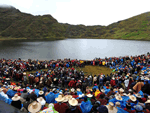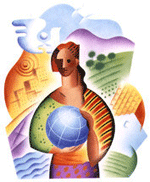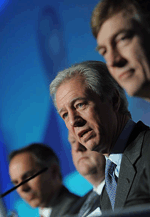Published on Wed, 2012-07-18 10:51
The International Network for Economic, Social & Cultural Rights (ESCR-Net), transmitted on 11 July a communication to the Government of Peru to request urgent action to protect the human rights of people protesting the Conga gold mine in Peru after five people lost their lives in the week of July 3, on a wave of “disproportionate police repression”. |
Published on Tue, 2012-07-17 11:15
The Association for Women’s Rights in Development (AWID) suggests that a discussion about the implications of the proposed UN Fifth World Conference on Women in 2015, and 20 years after the last one in Beijing, is urgently needed among feminists and women’s rights activists from all regions of the world. There are diverse opinions about the organization, hosting and purpose of the proposed conference, which have not been broadly debated, wrote on AWID’s web site Susan Tolmay, in charge of Information at this institution. |
Published on Sat, 2012-07-14 22:12
African civil society organizations called on governments to shift from being mere regulators to become promoters of investments in the mining sector at a conference convened in Accra by the Third World Network-Africa (TWN-A). The meeting was aimed to improve and deepen their knowledge on the African Mining Vision (AMV), a strategic plan signed in 2009 by the heads of State. |
Published on Sat, 2012-07-14 22:08
Marcus Agius was called in 2006 to manage the rescue of Barclays Bank, a British firm on the verge of bankruptcy due to irresponsible financial bets. Six years later, on Monday 2 July, the City woke up to the news of the resignation of Agius to all his public and private offices due to “unacceptable behavior within the bank”… nothing less than the largest financial fraud ever attempted, a white-collar theft of billions of dollars that has duped governments around the world and ultimately impoverished millions of people who never heard of Agius, Barclays or the City of London and just happened to have borrowed money from a bank. |
|
Published on Fri, 2012-07-13 16:02
The international community needs to be ambitious and work to solve the urgent global crisis of today. A "business as usual" process to update the agreed goals that expire in 2015 is not enough. That was the main message to the United Nations of the final panel held July 6 in New York as part of the Development Cooperation Forum, the first high level international debate after the Rio+20 Summit. Juan Somavía, director general of the International Labour Organization (ILO), and Roberto Bissio, coordinator of Social Watch, were among the speakers. |
SUSCRIBE TO OUR NEWSLETTER






